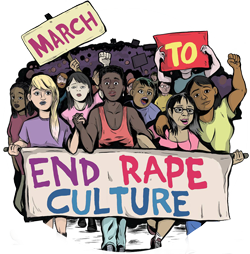We as a society subscribe to beliefs, attitudes and behaviors that influence how we think about and respond to rape. When these ideas excuse and tolerate sexual violence, this is rape culture.
Rape and sexual assault are being discussed in popular media with more frequency these days, but we don't need to be told the severity of the problem; most people know survivors, or may be survivors themselves. What causes this epidemic is we as a society subscribe to beliefs, attitudes and behaviors that influence how we think about and respond to rape. When these ideas excuse and tolerate sexual violence, this is rape culture.
Rape culture includes many issues such as:
domestic/intimate partner violence
sexism
gender roles
toxic masculinity
transphobia
homophobia
sexist media messages
sex negativity
LACK OF EDUCATION AROUND CONSENT
street harassment
slut shaming
victim blaming
rape myths
microaggressions
entitlement to women's bodies
sexual objectification
rape jokes
GASLIGHTING
All of these issues are amplified when intersecting with discriminations such as those based on race, ethnicity, ability, sexual orientation, and gender.
We end up accepting these issues as something that is an unavoidable part of life, or may not even recognize when they occur, which leaves women and marginalized groups being treated like second class citizens as rapes are committed with more frequency. These toxic ideas not only ignore and excuse these abuses, but often condone and encourage them while survivors get less support and less justice.
We march to help raise awareness in the community about this problem and what we can do to end it. It is also a healing place where survivors can be supported, speak up, and find information about local resources, and allies can join in to learn more and support survivors in ending rape culture.
further reading
Who is affected
Every 107 seconds, a person in the United States is sexually assaulted. 44% of victims are under 18 and 80% are under 30 years old, while 2/3 of perpetrators are known to the victim. 68% of sexual assaults are not reported to the police and 98% of rapists will never spend a day in jail. (source)
Any person can be raped, and the consequences and normalization of sexual assault affect everyone. However, it's important to know that certain populations are more at risk for sexual assault. This includes women, trans individuals, LGBT people, immigrant women, disabled people, college students, homeless youth, women of color, sex workers, and women in the military. Any combination of these identities means higher risk and often times even less opportunity for justice.
The Fallout
Having a traumatic experience like rape can take a toll on a person emotionally and physically. The person may experience debilitating outcomes such as depression or post-traumatic stress disorder. However, rape culture in its entirety creates an even greater negative impact on the person who is raped by creating an environment of silence, shame and injustice.
Victims of sexual violence are at 3 times more likely to suffer from depression, 6 times more likely to suffer from post-traumatic stress, 26 times more likely to abuse drugs, and 4 times more likely to contemplate suicide. (source)
History of the march
Speaking to a group of college students in Toronto, a police officer offered some advice for safety, saying the best way to avoid being raped was for women to "avoid dressing like sluts." His words were not unfamiliar, as victims of sexual violence are blamed all over the world for what happened to them. This incident inspired the first "Slut Walk", held in Toronto in April of 2011.
The movement spread across cities and countries, including the first Philadelphia 'Slut Walk' in August of 2011. Since that time, our group has evolved to continue to fight against rape culture while also striving to be more collaborative and inclusive. We changed the event name to the March to End Rape Culture in 2013, and have continued with that name to the present date.















